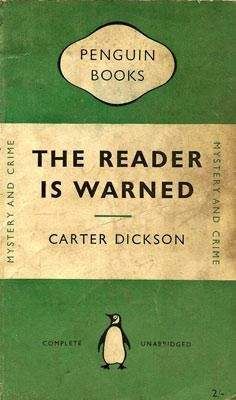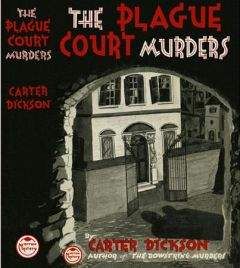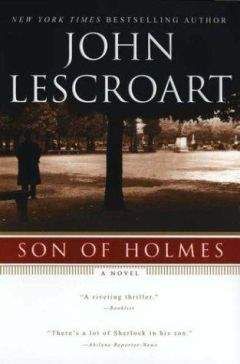John Carr - The Reader Is Warned

Помощь проекту
The Reader Is Warned читать книгу онлайн
'Sit down, son,' he said.
CHAPTER XVIII
Police-constable Leonard riddle, of C Division, had a beat along which, it is true, little in the way of violence or crime ever happened. And P.O. Riddle was content to have it so. ‘
He liked his beat, not only for the mingled life and quiet of it, but for the pleasurable feeling it gave him of having some acquaintance with the nobs, of being behind the scenes, of, unobtrusively, helping tend the lares and penates of an admirable house. His beat skirted Park Lane, took him along Mount Street to Berkeley Square, down round the curve of Curzon Street, and back to Park Lane again. Odd how much information you picked up about people, even when they never noticed you. You could tell how things were going; who went where; what the domestic troubles were; all of a good many who were aware of you only as something to say good night to. P.C. Riddle had his favourite people, as he had his favoured parts of the beat. Few of them he knew as names, though many chauffeurs were his friends. But many were ticketed in his mind as numbers, with some corresponding description, as a cloakroom attendant will ticket hordes by a catch-phrase and return the right hat without any slip of paper to identify it. Sometimes he felt fatherly and a trifle godlike. When someone in private life told him he was a student of human nature, he was pleased.
This term had even, in fact, been applied by one of his numbers. There was a night when number eleven D'Orsay Street (junior, not the old man) was coming home from a cocktail-party at three o'clock in the morning; and number eleven D'Orsay Street had draped himself over a pillar-box and insisted on talking first about astronomy and then about the perfidious nature of woman. Having just been given the raspberry by his fiancée, number eleven was in a philosophic mood. In the course of his remarks he had called P.C. Riddle a student of human nature: just as we all, when whiffled, like to think that the person we are talking to is as profound as we are. But he had always liked number eleven afterwards; it was one more reason why D'Orsay Street, a little cul-de-sac off Mount Street, was of interest to him.
And it was the cause of a new, unpleasant interest now. Riddle knew a few names there. Number nine, for example, was a fine Regency mansion now turned into flats with incredibly steep rents. Mr and Mrs Constable, had occupied the flat on the first floor. In common with most of London, Riddle knew all about the Constable family; but he had known a little about them before the crimes whose echoes had stirred even into Mayfair.
Mrs Constable, for instance. She had several times tried to ask him questions about the police, poor lady. Once she had come bouncing down the steps into the street, bobbing along beside him, holding her hat while she tried to keep pace with him - and if there is anything your constable dislikes, it is having someone walk along the beat with him -while she poured out queries.
For several nights F.C. Riddle had been thinking about her. It is too much to say that he was haunted; he was not haunted by anything. But in the midst of the uproar, while Teleforce shouted from the newspaper bills and animated the street-corners, he always walked slowly when he passed number nine D'Orsay Street. And he thought.
He was not concerned with the investigation of crime. In fact, when once they raided a number off Curzon Street and found a gambling-house, he was startled; well as he knew the neighbourhood, he had no idea of this until he got his instructions; and he felt annoyed with the gambling-house for not knowing about it. But, again in common with most of London, he found himself groping for explanations. He didn't like to think about it; he didn't like to think about anything that disturbed him. He could not help himself.
On that gusty Wednesday night - following the inquest on the body of Mr Constable in the afternoon - his eye had been caught by a newspaper bill in Park Lane. He had not seen an evening paper; he had not had time. In a hazy way he had hoped that they would do something to this man Pennik. But the bill stared out at him in red letters.
pennik in paris
Anger stirred in P.C. Riddle's soul, stirred and spread like glue out of a bottle. So they'd let him go. So he'd be at it again. And this time Lord only knew how far the monkey would go. During near-war crises Riddle had had much the same feeling: that you couldn't trust the world at all: that in the course of only a few days you were suddenly bang against the unbelievable, with everything turning upside down.
At the mouth of Mount Street he slowed down his tread.
He was half tempted to do something he had never done’ in his life. For he had a pal who had got on: who was, in fact, a sergeant in the finger-print department of the division. Riddle was half tempted to ring up Billy Wynne (he could use the phone at number four, the chemist's) and tell him a theory which had remained stubbornly in his head for days. Of course, Billy wasn't one of the high muck-a-mucks. But he was C.I.D. anyway, and would know whom to go to. Riddle himself knew none of the high muck-a-mucks. He did happen to know one of the Yard chief inspectors, Masters, by sight; only a couple of years ago there had been a row in Lancaster Mews, near here, when the 'Ten Teacups' case blew up. Also, there was the old gentleman named Merrivale. But, on the whole, better speak to Billy Wynne and let him do it.
Ring up Billy?
No; better not. Only get a ticking-off if he did, and serve him right.
P.O. Riddle resumed his steady tread along a dim and apparently deserted street. There was a high, clear moon, and a warmish gusty wind which chased a discarded newspaper across the pavement ahead of him.
Steady growl of traffic from beyond; steady watch-tick; everything steady. It was twenty minutes to ten. Pennik in
Paris, Pennik in Paris, Pennik in Paris! Here: wasn't Pennik due to speak over Paris P.T.T. at a quarter to ten? The fruiterer at Four-b Russell Lane, the little alley only a step away, had a wireless; and it would be easy to drop in for a few minutes' listening. But better not. He had to meet his sergeant at ten; this round had to be spaced as steady as a clock.
P.G. Riddle, crushing down temptation again, kept to his regular tread and turned into the little cul-de-sac called D'Orsay Street.
Here, half-way into it, he stopped.
There was an unusual noise.
Riddle knew the proper noises of his streets as a man knows street-noises from a familiar room. Anything out of line registered in his mind seconds before he began to think about it. This was not a loud noise, but he tracked it along carefully to where the super-swank number nine thrust its heavy masonry at the moon.
Beside number nine, whose first floor-flat had been occupied by Mr and Mrs Constable, was a tall narrow gate with fancy iron grilling. Behind number nine, Riddle knew, was a deep garden enclosed by high walls; and this gate opened on a little passage leading back to the garden. The gate was now open. It clicked and rattled very slightly in the gusts of wind. Even from a distance, if you kept a sharp eye out, you could see it move. In four years of patrolling this district, Riddle had never known it to be open before.
Mr and Mrs Constable were dead, so they couldn't have opened the gate. The tenant of the ground-floor flat, to Riddle's certain knowledge, was away from home. About the tenant of the top floor, he wasn't sure; that one had been at least until recently in the south of France, and might or might not have returned. But when the top-floor tenant was at home there were always lights and sometimes sounds of revelry. Not a light showed anywhere at number nine; and the gate continued to creak.
Riddle pushed it open and walked back to the garden.
The garden was mostly grass and trees. The thin, clear moon shone down into it, throwing the back of the house into shadow. Riddle could make out that the back of the house was a staring whited sepulchre of whitewash, dingy and peeling; that each floor had a long iron balcony stretching across it, with an ornamental iron handrail and separate sets of stairs leading down, so that each tenant had access to the garden.
Keeping into shadow by the house, Riddle peered out into this garden. He saw Pennik there.
There could be no mistaking that face turned up to the moonlight, the face that had turned and stared through the newspapers in every possible combination of face and profile. A chestnut tree, new and rich with foliage, threw a dense shadow on the edge of the grass; but Pennik - his eyes on the house - moved out from under it. . He was hatless, and his face (perhaps from a trick of the moonlight) looked bloated like a drowned man's. Riddle saw him slide his hand into his pocket and draw something out. Despite the vast whisper of wind in foliage, all sounds were whittled down to such a fine point that- Riddle distinctly heard the click, and saw moonlight run along the blade, as Pennik pressed the button of the clasp-knife.
Then Pennik, slipping the open knife into his pocket, moved out softly towards the house.
P.C. Riddle moved with him - sideways in shadow as Pennik-moved forward. When Pennik put his foot on the first step of the iron stairway, Riddle was close enough to breathe on him. He almost put his hand on Pennik's as the latter took hold of the hand-rail. But Riddle did not do that; he waited until Pennik was half a dozen steps up, and followed.
That grotesque, monkey-like climb in the dark was done in silence. Pennik did not look round. Or at least Riddle hoped it was done in silence. If he had any thought at all, it was a confused shouting to himself that he had been right after all. He ought to have rung up Billy Wynne. Might have done himself a bit of good.
Never mind. Leonard Riddle had his own satisfaction. He could tell 'em a thing or two, if he wanted to. So again Pennik was in two places at once, was he? No, he wasn't. Len Riddle could tell 'em why he wasn't. In London they might know a lot about detective work, but they didn't know anything about poachers...
The iron stairway creaked faintly. Pennik ahead was almost up to the first floor; Riddle could see the windows against the dingy whitewash. Then Pennik stopped, and Riddle also stopped so abruptly that he almost made the whole stairway shake. There was another man on the balcony just over their heads.
Riddle could not make out the face of the other man, who was of medium size and wore a soft hat and had his hand on the rail of the balcony. Riddle had a feeling that he was young; he also had a-feeling that Pennik, as Pennik's head appeared like a jack-in-the-box over the edge of the balcony, gave the other man a shock he refused to acknowledge. The two faced each other, and seemed to brace themselves.
In barely a whisper, so that it was difficult to distinguish the words, Pennik spoke. t
'Good evening, Dr Sanders,' he said.
(Sanders ? Sanders ? Wasn't that name familiar ?)
The young man moved out and stood squarely at the top of the stairs. He also spoke in a whisper.
'What are you doing here?'
'I have come to settle matters, Dr Sanders,' said Pennik.
In the distance, muffled by the night mutter, the bell of St Ald's Church struck the quarter-hour to ten. Pennik, throwing back his head and lifting his wrist, strained his eyes to peer at his wrist-watch in the dark. What he saw seemed to give him great satisfaction.
'Quite correct,' he whispered. 'And what are you doing here, Doctor?'
'I wish I knew,' said the other man, taking a hard grip on the rail of the balcony. 'I wish to God I knew. I wish they'd tell me.'
'I can tell you,' Pennik answered, and made a bound for the top step.
This was where P.C. Riddle acted. He was not dramatic about it; it was not in his nature to be dramatic. He merely took the remaining steps at a couple of long, efficient strides, and tapped Pennik smartly on the shoulder, from behind. At the same time he unhooked the bull's-eye lantern from his belt, switched it on, and turned the beam into Pennik's face as the latter swung round.
‘Now, then,' said P.C. Riddle. 'What's all this?'
The question was rhetorical. What answer he expected he did not know himself. But the last thing he expected was the expression of the face turned round towards him in the beam of his lantern. So stealthy had been Pennik's movements that the result was startling and almost shocking. Pennik's face looked queer and bloated because the man had been crying; crying like a child; crying until his eyelids were puffy and the whites of the eyes showed streaked with pink. He put up a hand to shield those eyes from the light. The corners of his mouth turned down - and he whimpered.
There was a stir of footsteps on the iron plates of the balcony. They were cautious steps, but plain as a noise of rats. The beam of an electric torch appeared and fastened on Riddle.
'What in hell's name are you doing?' muttered a voice, and it seemed impossible to get so much concentrated savagery of exasperation in words spoken under the breath. 'Put out that light!'
Both lights vanished after Riddle had turned his upwards. But what he saw so startled him that he risked one more gleam again afterwards to make sure. The speaker had been Chief Inspector Masters, who pulled his bowler hat down on his head and brushed the light away as though he were brushing something off his face. Beside him stood the old gentleman Riddle remembered from the Lancaster Mews row. Then, on the breezy balcony of a lightless house, P.G. Riddle tried to gather together his wits.
'What is it?' muttered Masters. 'What do you want?'
'Gate open, sir -' replied Riddle automatically. Then the more important matter wormed uppermost. 'I've got Pennik,' he added, and fastened his free hand on Pennik's collar.
'Yes, yes, that's all right. Hop it now, d'ye hear? Hop it! No, stand by; we may need you.'
'Sir, this is Pennik. He's not in Paris. I know how he did it. The same as the poachers did in Lancashire. My dad -'
'Let him go! What do you think you're doing?'
'Begging your pardon, sir. I was going to get in touch with Billy Wynne, but I'd like you to listen to me. They were twin brothers, the finest poaching team that ever devilled the magistrates. Tom and Harry Godden; one of them would clean up Sir Mark Wilman's park under the keeper's nose, but he'd have an alibi because the other would be at the pub with a dozen witnesses to prove -'
'Are you off your chump ?'
"There's two of Pennik,' persisted Riddle tightening his grip. 'I thought it was so before, sir; and I know it now.'
'Steady, son,' interposed a heavy voice. Riddle heard Sir Henry Merrivale breathe in the gloom. 'Keep your shirt on, Masters. Y'know, in a way he's quite right.'
'Thank you, sir. My dad -'
'Now, now! But let him go, son; take your hand off him. He hasn't done anything.'
'But these murders, sir -'
'He hasn't done any murders, son.'
Riddle's hand fell, the more so as this time there was no mistaking the look about Chief Inspector Masters in the gloom. It was the young man called Sanders who spoke. He spoke quietly and reasonably; yet Riddle had a feeling that he meant to be answered, and Riddle would have been impelled to answer him if he could.























